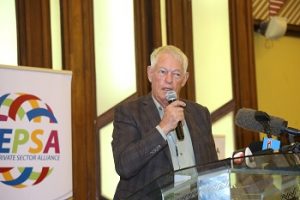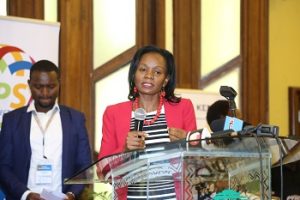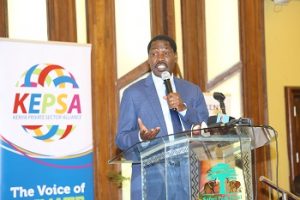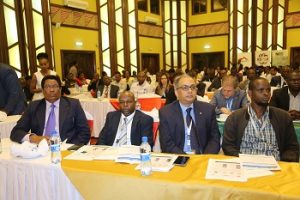KEPSA in partnership with the Ministry of Agriculture, Livestock, Fisheries & Cooperatives together with other partners, convened the first National Agriculture Summit on 26th – 27th February 2020 at Safari Park Hotel.
The objectives of the Summit included; Presentation of the Agriculture Sector Transformation and Growth Strategy (ASTGS); Creation of an Agricultural Transformation Roadmap over the next 3 years, based on a priority matrix that defines challenges and practical interventions for all the value chains; Discussing the Role of Counties in transforming agriculture as a devolved sector; Sharing learnings and recommendations from previous stakeholder engagements and understand key challenges and opportunities for Private Sector investments in the agriculture sector; and Official Launch of the Agriculture Sector Network (ASNET) as the sector apex body for the agriculture sector and the Sustainable Development Goal (SDG) Platform window on food and nutrition security.
In his opening remarks, KEPSA Trustee, Arch. Lee Karuri pointed out that the Agriculture Sector in Kenya continues to play a vital role in the economy, contributing 26% of Gross Domestic Product (GDP) and another 27% of GDP indirectly through linkages with other sectors. He observed that the challenges for smallholder farmers are numerous and extremely difficult to master individually. These range from the provision of services to the development of business skills to deal with the new circumstances. To address the challenges of integrating small producers and processors in their different groupings into modern value chains, innovative approaches and strategies were required.
Arch. Karuri informed delegates that the summit was a culmination of a number of stakeholder engagements since 2019 that had pointed out weak institutional framework as a huge gap in moving forward the agriculture transformation agenda. Harmonization of existing policy frameworks and rolling out appropriate interventions in the sector (spanning crops, livestock, and fisheries) will require one sectoral voice and a connected farmer’s first approach. Thus the goal of the Summit was to create a bigger platform for enhancing the voice of the agriculture sector in the Kenya economy
 KEPSA Agriculture, Livestock and Fisheries sector board Chair, Mr. Chris Wilson while speaking on the role of the private sector in Agriculture development pointed out that a lot needs to be done to increase productivity within the sector in order to create wealth through value addition. Mr. Wilson noted that the government, through stiff reforms and piecemeal interventions like the subsidy programme, has continued to deny the private sector an opportunity to offer new concepts and sound leadership.
KEPSA Agriculture, Livestock and Fisheries sector board Chair, Mr. Chris Wilson while speaking on the role of the private sector in Agriculture development pointed out that a lot needs to be done to increase productivity within the sector in order to create wealth through value addition. Mr. Wilson noted that the government, through stiff reforms and piecemeal interventions like the subsidy programme, has continued to deny the private sector an opportunity to offer new concepts and sound leadership.
In his remarks, KNCCI Chamber President Mr. Richard Ngatia recommended that partners and the government should invest in research and Big Data development for better decision making and performance management and youth involvement in the agriculture sector. He noted that addressing farmer organizations challenges and strengthening the institutions was a new approach in Kenya and is expected to raise the bar in terms of policy dialogues in the agricultural sector.
 In her opening remarks, KEPSA CEO, Ms. Carole Karuga, emphasized on KEPSA’s role in supporting sector associations among them KNCCI, Kenya Healthcare Federation, Digital Lenders Association, International Chamber of Commerce- Kenya Chapter. She emphasized that KEPSA is proud to launch the Agriculture Sector Network which will go a long way in increasing the bargaining power, collaboration and organization of the rather disintegrated agriculture sector in Kenya.
In her opening remarks, KEPSA CEO, Ms. Carole Karuga, emphasized on KEPSA’s role in supporting sector associations among them KNCCI, Kenya Healthcare Federation, Digital Lenders Association, International Chamber of Commerce- Kenya Chapter. She emphasized that KEPSA is proud to launch the Agriculture Sector Network which will go a long way in increasing the bargaining power, collaboration and organization of the rather disintegrated agriculture sector in Kenya.
In his keynote address, the Cabinet Secretary, Ministry of Agriculture, Livestock, Fisheries and Cooperatives, Hon. Peter Munya, emphasized the need to transform the agriculture sector, which he pointed out was under-performing with some of the key challenges being low productivity; low value- addition; access to quality seeds and weak marketing. In terms of key reforms undertaken by the Ministry, the CS highlighted the e-voucher subsidy programme, currently being piloted in Makueni County covering fertilizers. The program has been approved by Cabinet and National roll-out is planned. In the National roll-out, the government will introduce seeds and farm chemicals to better support farmers. Hon. Munya also said the government was also negotiating with fertilizer producers and blending companies to bring the cost of fertilizers down by KES 300 to facilitate access.
 The climax of day one was when Hon. Peter Munya, launched the Agriculture Sector Network and the SDG Platform window on food and nutrition security. The SDG Platform window on food and nutrition will be a door of opportunities for investment in the agriculture sector. It brings on board development partners, impact investors and government.
The climax of day one was when Hon. Peter Munya, launched the Agriculture Sector Network and the SDG Platform window on food and nutrition security. The SDG Platform window on food and nutrition will be a door of opportunities for investment in the agriculture sector. It brings on board development partners, impact investors and government.
Key speakers included Prof. Hamadi Boga, PS, State Department of Crops & Research, Mr. Ali Noor Ismail, Principal Secretary the State Department of Cooperatives, Prof. Micheni Ntiba – PS, State Department for Fisheries & Blue Economy and Mr. Harry Kimutai, PS, State Department for Livestock.
Development Partners made presentations on Best Practices in Agriculture led by Mr. Tobias Takavarasha – FAO Representative; Henning Høy Nygaard – Royal Danish Embassy; Ms. Esther Kasalu-Coffin – Director East Africa & Indian Ocean Hub, IFAD and Duncan Marigi – Embassy of Sweden, Agriculture and Rural Development Partners’ Group.
 During the 2-day summit, delegates deliberated on various sector issues around competitiveness, policy, partnerships, financing, institutional development and coordination. These agenda items were informed by the number of challenges that remain unresolved in the sector including low investment, low and declining productivity, low-value addition, weak policy frameworks, high post-harvest losses, weak marketing infrastructure, high production costs and weak extension service system.
During the 2-day summit, delegates deliberated on various sector issues around competitiveness, policy, partnerships, financing, institutional development and coordination. These agenda items were informed by the number of challenges that remain unresolved in the sector including low investment, low and declining productivity, low-value addition, weak policy frameworks, high post-harvest losses, weak marketing infrastructure, high production costs and weak extension service system.
Participants emphasized the need for increased partnerships and coordination in the agriculture sector to tap into new technologies and models that can transform the sector from mainly subsistence to one that is commercially competitive and sustainable.
While rooting for increased productivity in the sector Mrs. Alison Otieno, Acting CEO of Kenya Markets Trust noted that soil health was a key priority for increased productivity. ‘’We believe that the health of the soil is key to transforming agriculture through increased productivity, thus, contributing to increased Human Development Index (HDI) among rural poor’’, Said Mrs. Otieno. The Agriculture Sector Transformation and Growth Strategy (ASTGS) and the BIG 4 Agenda form the building blocks for this transformation journey.
With the right approach, Prof. Boga PS State Department of Crops & Research was optimistic that up to up to 80 percent of costs can be financed through public-private partnerships (PPPs), particularly in the agro-processing and arable land flagships through the Sh.440 billion ASTGS strategy
Mr. Ali Noor Ismail, Principal Secretary the state department of cooperatives underlined the importance of the PPP model as the strongest vehicle to transform and revitalize the agriculture sector. A coordinated, transparent approach will be necessary going forward to realize this vision and deliver the ASTGS among other obligations like the SDGs.
During the closing session KEPSA Foundation Chairman Arch. Lee Karuri read out the Safari Park Declaration on Agriculture, he underscored the power of collaboration, especially in a sector so crucial for millions of households and the economy is to be organized. “It is easier to bolster our commitments if we speak in one voice as an industry and that is why this conference is timely. We want to expedite our commitments to the sector and we can only achieve this through partnership,” Karuri said.
The Chief Administrative Secretary – Ministry of Agriculture, Ms. Ann Nyagah in the closing remarks noted the importance of agriculture in the national economy and hence the reason the Kenyan government is keen on implementing the ASTGS. She appreciated the steps made by KEPSA in championing the public-private dialogues in agriculture and coming up with ASNET which will assist in coordinating the sector more structurally.
The summit was attended by over 400 delegates and leaders from the agriculture sector, government, governmental agencies, farming communities, private sector, financial institutions, research institutions, Non-governmental organizations both local and international and development partners.







